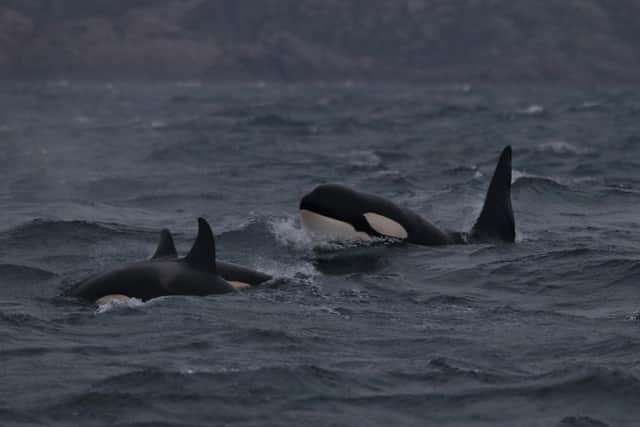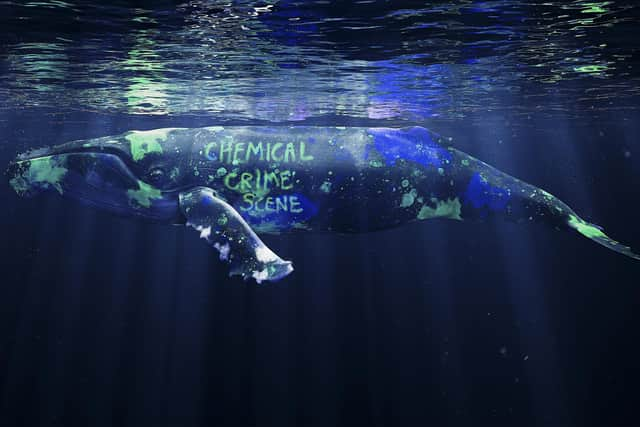Sustainable Scotland: Call for UK ministers to clean up ‘chemical crime scene’ and ban toxic pollution killing ocean wildlife
The call comes in response to increasing levels of harmful substances polluting the sea, including chemicals used in household products that persist in the environment and build up inside sea creatures such as seals, dolphins and whales.
The Marine Conservation Society (MCS) is urging the UK to create a strong new chemicals strategy and an end to non-essential use of harmful ‘forever’ substances.
Advertisement
Hide AdAdvertisement
Hide AdThe plea comes as the UK government comes under fire over plans to abolish hundreds of laws covering water quality, sewage pollution, clean air, habitat protections and use of pesticides as part of a drive for deregulation and economic growth.
The move comes despite a post-Brexit commitment to halt the decline of nature by 2030.
Now MCS campaigners say ministers must “deliver what they have promised”.
As part of its Stop Ocean Poison campaign, the group is demanding “a strong, fit-for-purpose” UK chemicals strategy and measures to end use of harmful enduring compounds known as PFAS.
“The impact of chemical pollution on our blue planet is profound,” said MCS chief executive Sandy Luk.


“If we’re going to prevent further environmental breakdown and fight the biodiversity crisis we must address chemical pollution.
“The UK government’s recent announcements pit growing the economy against maintaining environmental protections.
“But there can be no long-term economic growth or national food security if our environment is a chemical crime scene.


Advertisement
Hide AdAdvertisement
Hide Ad“We can’t allow progress on protection from chemical pollution to be put in jeopardy.
“We need a strong UK chemicals strategy to address the huge scale of the chemical pollution crisis.
“Instead, the UK government is proposing ripping up existing laws and taking a massive step back on progress.”
Dr Francesca Bevan, chemicals policy and advocacy manager at the charity, added: “My heart breaks every time I see another study detailing the impacts of chemical pollution on the planet, wildlife or people.
“We’ve been waiting patiently since 2020 for a chemicals strategy, as promised by the UK government.
“But enough is enough. We’re running out of time, the ocean is running out of time.
“Hazardous chemicals, including forever chemicals, shouldn't be used in consumer products, and UK government action should be taken to stop the most harmful chemicals being used.
“Instead, the pollution continues.”
Research suggests that potentially hazardous chemicals are present in all water on earth, including drinking water, and continue to accumulate as more are produced and end up in rivers, lochs and seas.
Advertisement
Hide AdAdvertisement
Hide AdMeanwhile, global chemical production has been projected to double by 2030.
Perfluoroalkyl and Polyfluoroalkyl substances (PFAS) are a wide-ranging group of synthetic compounds with a suite of useful properties, including resistance to heat, water and grease.
They are used in everyday products such as waterproof clothing, food packaging, healthcare products and non-stick pots and pans.
But the chemicals are also some of the most long-lasting of all man-made substances, meaning they build up over time.
Tests have shown that some PFAS cause harmful effects when they amass in living things, including disruption to reproduction and development of foetuses.
Several PFASs are thought to cause cancer in humans, while some are also suspected of interfering with hormonal systems in people and animals.
Studies have found evidence linking harmful chemicals with ill health in marine wildlife, including harm to nervous systems, immunity and ability to reproduce.
The resilience of affected animals to other stressors such as climate change and disease was also shown to be impacted.
Advertisement
Hide AdAdvertisement
Hide AdExperts have predicted the demise of the UK’s only resident killer whales, which are based in Scotland, blaming a build-up of the chemicals for a lack of young being born.
A study of grey seals on the coast of Scotland between 2015 and 2017 found that pups had by the time they were 18 days old already accumulated high enough levels of persistent chemicals in their blubber to impact function and potentially hamper their ability to survive their first year of life at sea.
Analysis of otters which died in England and Wales between 2014 and 2019 and 2007 and 2009 revealed all contained PFAS – four out of five of the animals had at least 12 different types of the chemicals in their livers.
Meanwhile, harbour porpoises which have accumulated the substances in their system have been shown to face a 41 per cent greater risk of infectious diseases than those free from the pollution.
Comments
Want to join the conversation? Please or to comment on this article.
